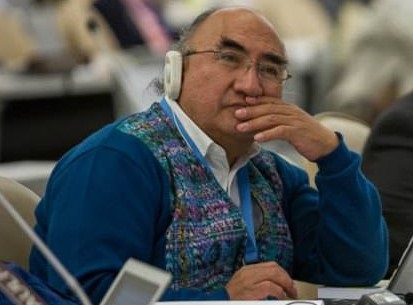UN Special Rapporteur on the Rights of Indigenous Peoples, Francisco Cali Tzay, on Wednesday, May 13, 2020 launched what looks like his first formal study focused on the human rights impacts of the COVID-19 pandemic on the rights of Indigenous Peoples.

A questionnaire for Indigenous Peoples, States, NGOs, UN bodies, and relevant agencies is posted in English, Spanish, and French on the web page of the Office of the UN High Commissioner on Human Rights.
The Special Rapporteur is calling for responses by June 15, 2020 due to the urgency of the situation. The outcomes of the study will be presented to the 75th Session of the UN General Assembly, which will begin on September 15, 2020.
The questionnaire appears to cover a wide range of issues and impacts on Indigenous Peoples’ rights to health and medical care, food, livelihoods, cultural practices, mobility, access to vital services and infrastructure, self-determination and participation in decision-making regarding the development and implementation of their own as well as the State’s responses to the pandemic.
It also requests information about human rights violations occurring and, in some cases, increasing, during this crisis, including development projects lacking the free prior and informed consent of the Indigenous Peoples impacted and reprisals against Indigenous human and environmental rights defenders.
It also calls for the submission of good practices and identification of gaps by states, Indigenous Peoples, and other relevant parties.
Francisco Cali began his mandate as Special Rapporteur on May 1, 2020, with the pandemic already underway. He explains why, given his other priorities addressing the rights of Indigenous Peoples, that he selected this study to be the first of his three-year term.
He said: “Prior to assuming my mandate, I had already designated a list of priority issues for the first year of my term. This includes land and resource rights, Indigenous human rights defenders, rights of Indigenous elders, women and children, Indigenous persons with disabilities, cultural rights, and militarisation.
“Based on the urgent information I have already received from Indigenous Peoples from all regions, I can confirm that the COVID-19 pandemic, in both its impacts and the responses undertaken by some States, directly impacts all of these rights and concerns, and must be addressed in the most urgent manner by my mandate.
“I look forward to hearing from other Indigenous Peoples as well as the States and other relevant actors on this urgent situation, although much of the information I am receiving is heartbreaking and creates profound concerns for me.”
